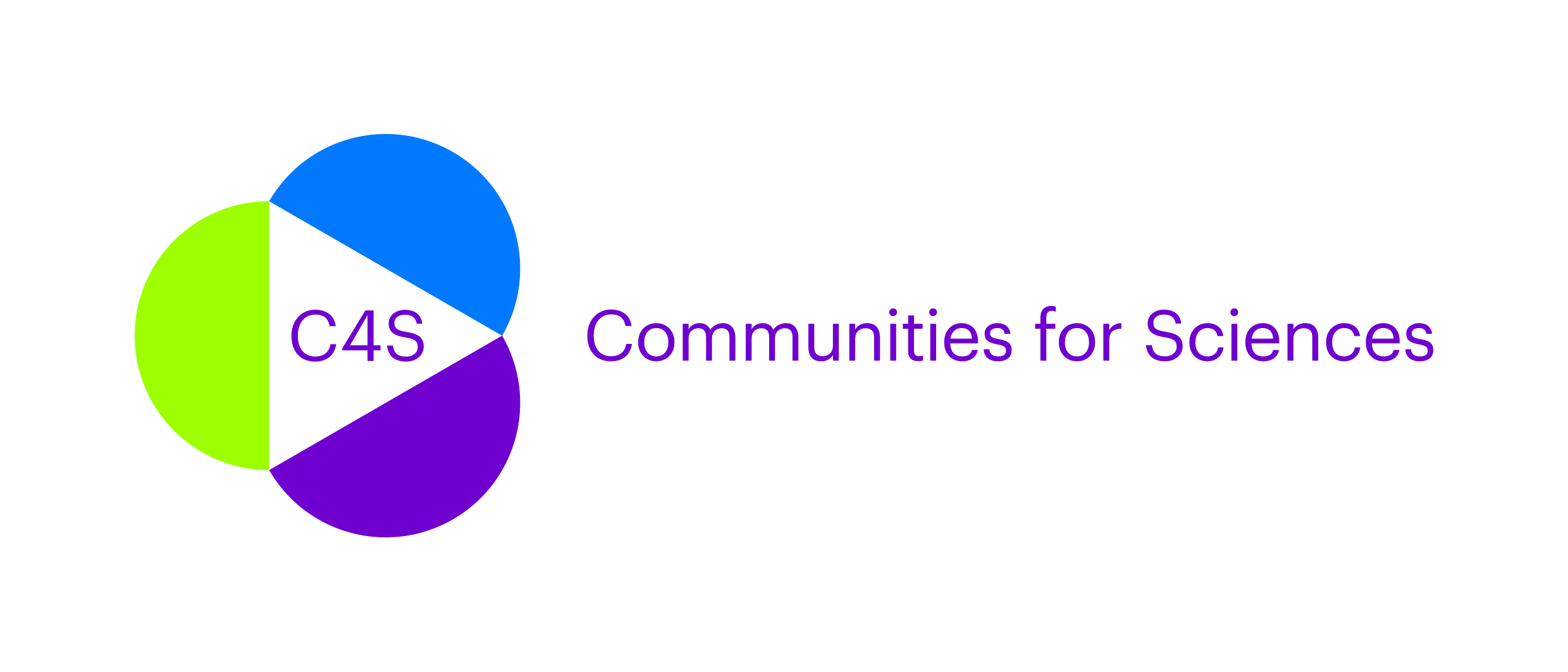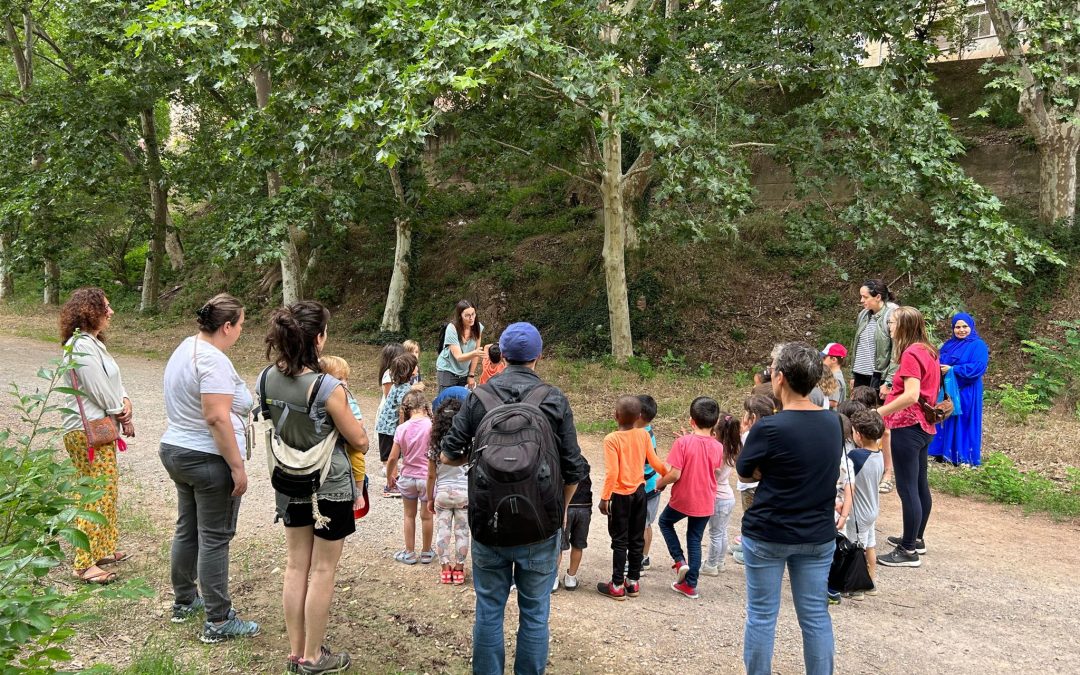
by Àngels Fusté | juny 21, 2023 | General
About a hundred people gathered last Monday, 19th June, on the banks of the Cardener River in Manresa to attend the presentation of the field guide “Trees of the banks of the Cardener River”, which has been prepared by UManresa and the Valldaura School of Manresa. The Field Guide is the result of the collaboration between the students and teachers of the Valldaura School and the Horizon 2020 project “Communities for Sciences – Towards promoting an inclusive approach in science education” (C4S) led by UManresa, which was born from the scientific curiosity that the children of the School have developed for their natural environment.
Prepared by the children and the educators, with the collaboration of Pol Huguet, councillor for Green City and Urban Planning of Manresa City Council, and the members of the Manresa hub of the C4S project, the publication is a didactic resource that includes drawings by the student body and photos and useful information about the trees that grow on the banks of the Cardener river. It is in this natural setting where the presentation of the guide was made by the authors, which was enlivened by a route guided by the children around the banks of the Cardener and the municipality’s Fabrica dels Panyos. The event was also attended by Montserrat Pedreira, director of the UManresa Bachelor’s Degree in Early Childhood Education, Gabriel Lemkow, coordinator of the project “Communities for Sciences (C4S) – Towards Promoting an Inclusive Approach in Science Education” (C4S), and Miryam Navarro and Lyudmyla Kokorina, researchers of the C4S project.
UManresa will make this guide available free of charge to all schools in Manresa, as well as to all citizens interested in the natural heritage and biodiversity of the city, through the official website of the European C4S project: www.communities-for-sciences.eu. It is also planned to distribute this work at the Josep M. Aloy Documentation Centre for Children’s and Young People’s Literature at the UManresa, which has a collection of over 8,000 volumes of novels, short stories, plays and poetry for children and young people in Catalan.
“Communities for Sciences” (C4S), a project to awaken scientific vocations
The publication of the guide is the result of the inclusive scientific education pilot activities of the project led by UManresa C4S, which is part of the Horizon 2020 program, and which aims to promote science in an inclusive way among all the collectives of the society, especially those at risk of a vulnerable situation. The project also aims to make gender diversity and equality visible in science education, from an educational perspective.
The starting point of this project is the expertise of the teachers of the Master’s Degree in Early Childhood Education at the Faculty of Social Sciences of Manresa and, more specifically, of the teaching staff and educators linked to Lab 0_6: Centre for discovery, research and documentation for science education at early ages, a physical space located at the university that collects a whole range of proposals related to experimentation and science, open to both school groups and families.
The celebration in Milan, Italy, of the general assembly of C4S, last May, puts an end to the activity of the project, which started its work on October 1, 2020, and which is expected to reach the following milestones in the coming months: the creation of an International Observatory for Inclusive Science Education and a white paper on inclusive science education, addressed to policymakers and educational institutions.
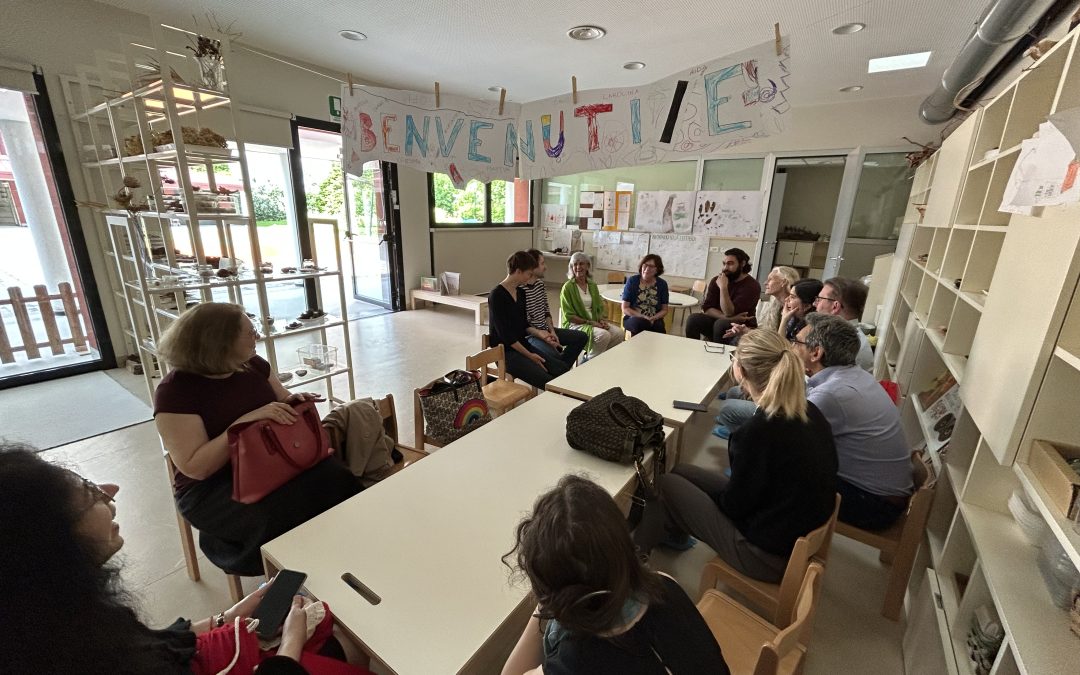
by Àngels Fusté | juny 7, 2023 | General
On 26th May 2023, the consortium linked to C4S concluded the European project General Assembly, held in Milan, Italy. The Milan hub, integrated by the University of Milano-Bicocca and the GiocheriaLaboratori, hosted the event, which was attended by around thirty people from institutions in eight European countries.
During the assembly, the strategic actions and activities of the previous year were presented, as well as those that will mark the coming months, all with a common denominator: the importance of science as an enabler of inclusion and equity. “Science is the best way to understand how the world works”, said Gabriel Lemkow, coordinator of the project “Communities for Sciences (C4S) – Towards Promoting an Inclusive Approach in Science Education“, in the round table that closed the assembly, which also included the participation of specialists from the University of Milano-Bicocca. Among others, Roberta Garbo, Rector’s Delegate for Disability and Specialised Disorders, Carlo Antonini, scientist and lecturer at the Department of Materials Science, and Andrea Mangiatordi, researcher and member of the Department of Human Sciences for Education “Riccardo Massa”.
The participants also enjoyed other activities such as visits to the GiocheriaLaboratori, an educational service and science centre for children from 3 to 11 years old, located in Sesto San Giovanni (Milan), the Bambini Bicocca School, an initiative of the University of Milano-Bicocca to promote research and dissemination of educational experiments in the field of childhood, and the B. Inclusion, a specific service of the University mainly aimed at future students and students with other abilities or learning disabilities.
This is the last assembly organised by the European project Communities for Sciences, which started its work on 1 October 2020, and is expected to finish in the next few months, with the achievement of these goals: to have an International Observatory for Inclusive Science Education, to have an image bank of inclusive science education, a style guide for inclusive science education and a white paper that will be useful when making decisions from institutions to advance science education for all.
“Communities for Sciences” (C4S), a project to awaken scientific vocations
The C4S project is part of the Horizon 2020 programme and aims to bring science in an inclusive way to all groups in society, especially those at risk of vulnerability. The project also makes diversity and gender equality in science education visible from an educational perspective.
The starting point of this project is the expertise of the teachers of the Master’s Degree in Early Childhood Education at the Faculty of Social Sciences of Manresa and, more specifically, of the teaching staff and educators linked to Lab 0_6: Centre for discovery, research and documentation for science education at early ages, a physical space located at the university that collects a whole range of proposals related to experimentation and science, open to both school groups and families.
This research is also carried out within the framework of the Knowledge Construction Research Group (GRECC), which aims to deepen the understanding of how knowledge is constructed in different learning contexts, in order to identify key aspects related to the design of educational practices and how these designs shape models of knowledge production that ensure the democratisation of education and diversity in a broad sense.
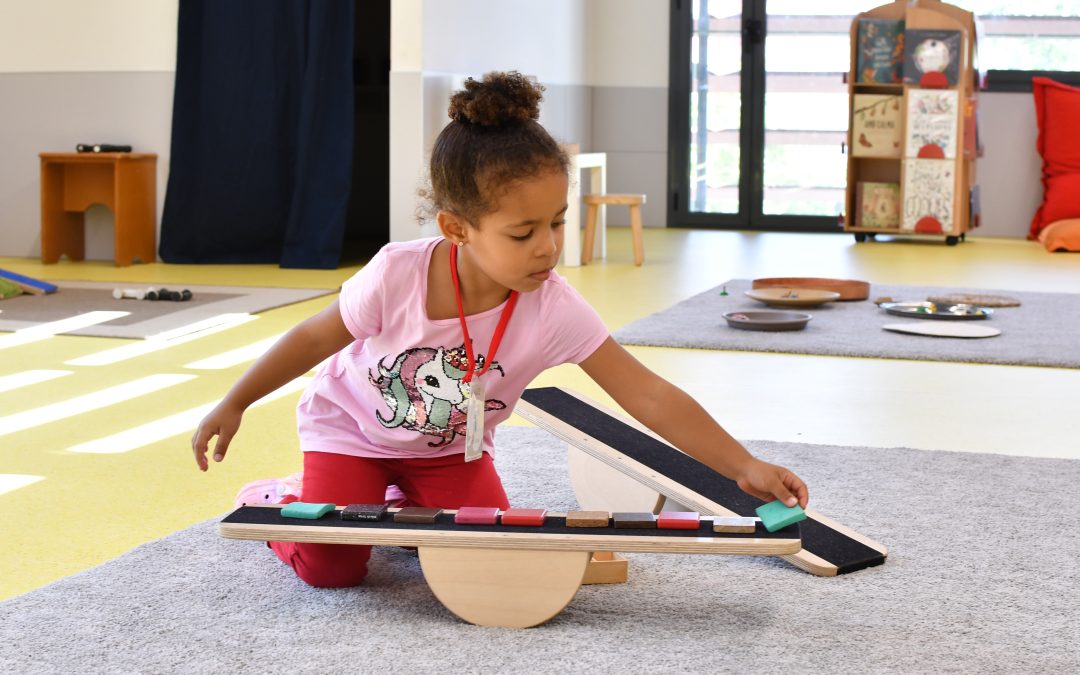
by Àngels Fusté | nov. 10, 2022 | General
About fifty people from universities in countries such as Belgium, Bulgaria, Ukraine, Slovakia, England, Hungary, Sweden and Spain, and linked to the fields of research, science and education attended the workshop “Critical image analysis of inclusive science education in the media”, on 8 November. This workshop is part of the European “Communities for Sciences – Towards project promoting an inclusive approach in science education” (C4S), led by Fundació Universitària del Bages (FUB), whose aim is to work with communities at risk of vulnerability and promote engagement in inclusive science education.
The objective of the first block of the workshop was to promote critical reflection in the context of decolonisation, on the role of education in the construction of equitable and inclusive societies. Isidora Saez Rosenkranz, Laura van der Reijden, Diana Reinoso, Sheddad Kaid Salah, and Andrea Cerroni come from different nationalities and families, ethnic and cultural backgrounds, were the main speakers at the round table.
The second part of the session focused on “the power of photography to generate new real and inclusive narratives, replacing the hegemonic narrative”, according to Laia Gómez-Franco Estrella, responsible for educational projects of RUIDO Photo.
The main conclusions drawn from the workshop will serve as a starting point for the future guide on Inclusive Science Education of the C4S project.
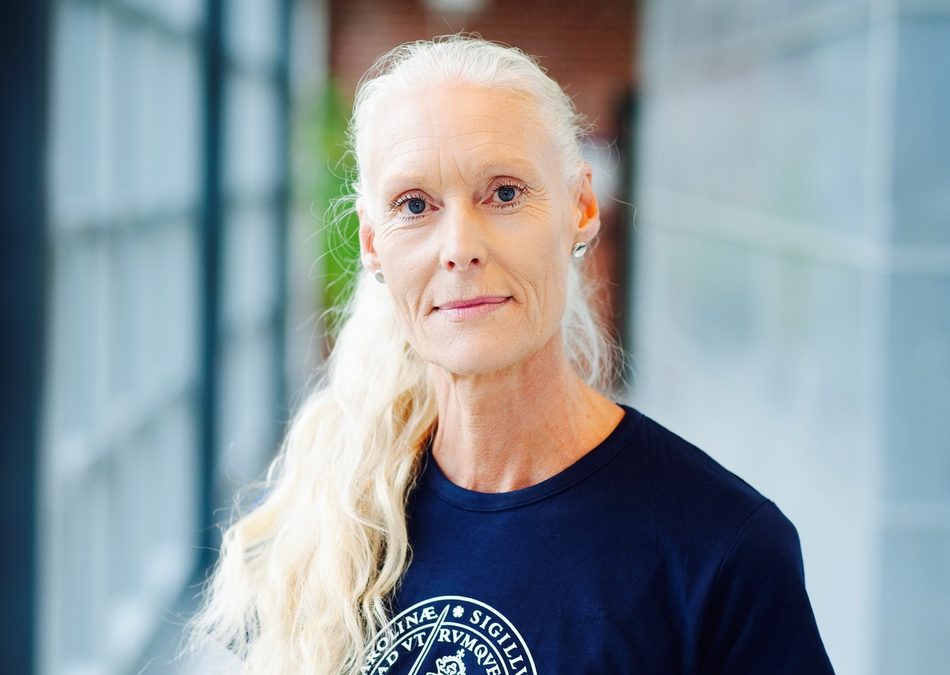
by Àngels Fusté | nov. 10, 2022 | General
Kristina Orban (PhD) is a lecturer and researcher at the Department of Health Sciences, Faculty of Medicine, Lund University, with a research focus on Family-centred health promotion interventions. In this interview Kristina Orban talks about the challenge of awakening an interest in science among children and families in vulnerable situations.
What is your background and what is for you more interesting about this Inclusive Science Education approach? How did you go about making yourself an expert in ISE?
My background is 30 years of experience from working with children with special needs. I have worked specifically with children with neurological disorders, neurodevelopmental disorders, and children with obesity. Inclusive education and equal play opportunities are some of my areas of interest. All children have a right to participate in playful learning activities as it underpins well-being, health, and development.
A child with special needs can add an appreciable extra amount of stress into family systems. How family members organize their time, engage in daily activities, and interact with one another vary from one family to the next and on the socioeconomic spectrum. Parents who experience stress because there are too many things to be done and not enough time for play and co-occupations in the family may need support.
What is the origin of the cooperation between Lund University and the C4S project? What is your role in the project?
I have experience from being the project lead in an Erasmus + funded initiative entitled ‘Making Internationalisation a Reality for Occupational Therapy Students’ (MIROTS). Through MIROTS, Lund University (Sweden), University of Southampton (UK), and the National University of Ireland, Galway, (Ireland), collaborated to develop the skills of emerging occupational therapy practitioners in negotiating, partnering, and advocating for the rights of socially excluded groups in European society. In the final year of the Erasmus project, we invited University of Vic (Spain) to participate with our students. The main educational goals were to develop a deeper understanding of occupational (in)justice within each of the host institution’s local community, while acknowledging and seeking understanding of diversity and culture in daily practice and the professional responsibilities to create inclusive societies for all.
My role in the C4S project is mainly research and acting as a discussion partner together with project coordinators and other participating institutions, in an effort to generate transformative learning between educators and researchers.
Could you briefly explain what is for you relevant regarding the notions of diversity, equity, and inclusion and indicate how they might relate to one another in the C4S project? Which do you consider to be the most important for people and organizations to focus on and why?
I think community-based participatory methods in science education is an urgent issue to empower children and families in vulnerable situations. When it comes to science, many children, especially those who belong to so-called vulnerable communities are left behind. So, to achieve equity on all levels, it is relevant to promote co-created inclusive science education with and for local communities. Having an intense focus on justice for minorities is valuable and an essential prerequisite for the social practice of science.
And what can you say about the role of children in processes of inclusion? Can we say that the child’s view is the most inclusive of all?
To empower children and to promote Inclusive Science Education is an ongoing process aimed at offering quality education for all while respecting diversity and eliminating all forms of discrimination. I think if children shall experience inclusion and be able to participate in learning and playful activities, we must involve children in planning and decision that regards them. When learning a new skill or being motivated to participate in a new activity we must look for “just right challenge” that empower every child to be able to grow and learn.
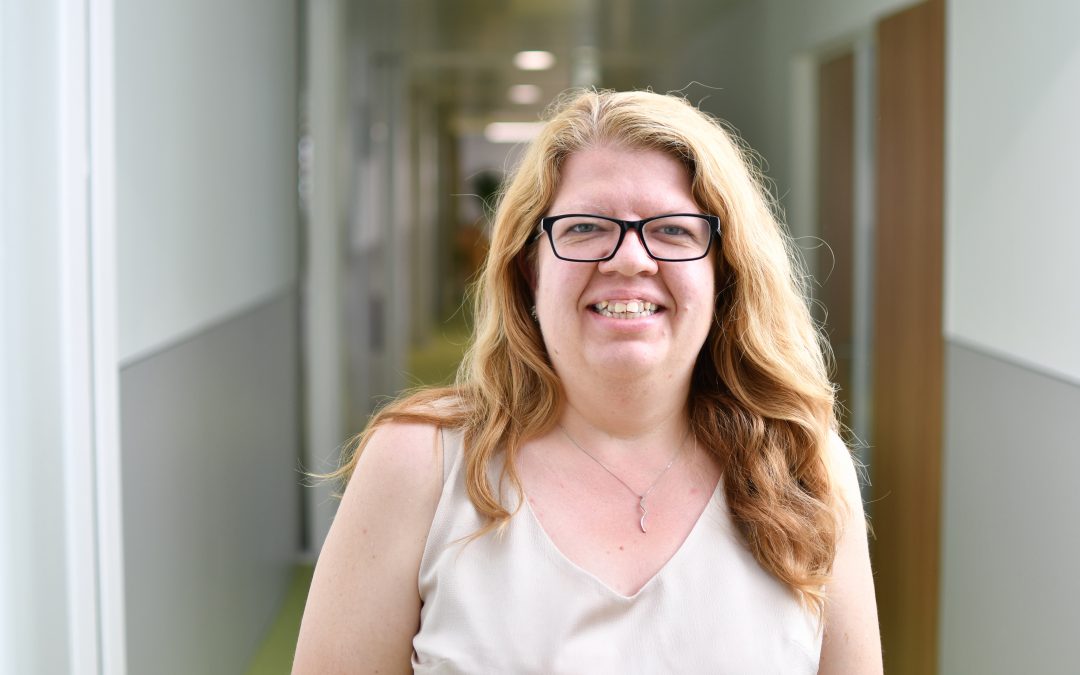
by Àngels Fusté | juny 29, 2022 | General
Since last June, Lyudmyla Kokorina is part of the “Communities for Sciences – Towards promoting an inclusive approach in science education” (C4S) project as a research assistant through the European Commission’s Horizon for Ukraine programme. Lyudmyla has a PhD in “General Pedagogy and History of Pedagogy” and worked in Horlivka Institute for Foreign Languages of State Higher Educational Institution Donbas State Pedagogical University since 2007.
How and why were you incorporated in the “Communities for Sciences – Towards promoting an inclusive approach in science education” (C4S) project?
I wish I knew the exact answer. Probably, it’s just the very moment when everything centred and focused on the project and me forming a part of it. The situation in Ukraine forced me to leave home for the second time and go abroad searching for safety. And thus, become one of the millions of Ukrainian job-seekers. Later, the project coordinators read my CV, appointed an interview, and made their decision. And now I’m being interviewed as a new member of the C4S team. I think that my professional competencies and work experience can add to the project and bring a view from a new perspective. All C4S members have proved to be a great team in creating, supporting, and promoting tools for successful Inclusive Science education at all social levels.
Did you know about the C4S project before?
Frankly speaking, I didn’t know about the project before. But now I’m glad to be a part of it since I had some experience with non-discrimination education and inclusiveness. Together with the students, we practised research tools on the social attitude towards inclusion in Ukrainian schools.
What do you do as a research assistant at C4S? Is it like what you did in your country?
The tasks are rather different but very interesting. First, I had to learn some more about the idea and details of the project by studying articles and opinion essays about the research area. And then I naturally joined the observations and further activities of data collecting and processing. Considering my work in Ukraine I was more involved in the daily routine of institutional administrating and teaching classes. And my research area was mainly from the perspective of foreign language teaching and comparative pedagogy.
You are an expert in Pedagogy. How do you think we can contribute to the improvement of educational inclusion processes in the classroom?
I never considered myself to be an expert, but what I believe is that a person should never cease doing good things. Therefore, the best way to contribute to enhancing inclusive education is to continue rolling out inclusive education at all stages of education and involving more people in its implementation. Luckily, I had the possibility to observe inclusive science education “in action”. Now I’m sure that it really functions because when a teacher inspires his/her pupils, they strive for knowledge and discoveries. Just like in my favourite quote from William Arthur Ward: “The mediocre teacher tells. The good teacher explains. The superior teacher demonstrates. The great teacher inspires.”
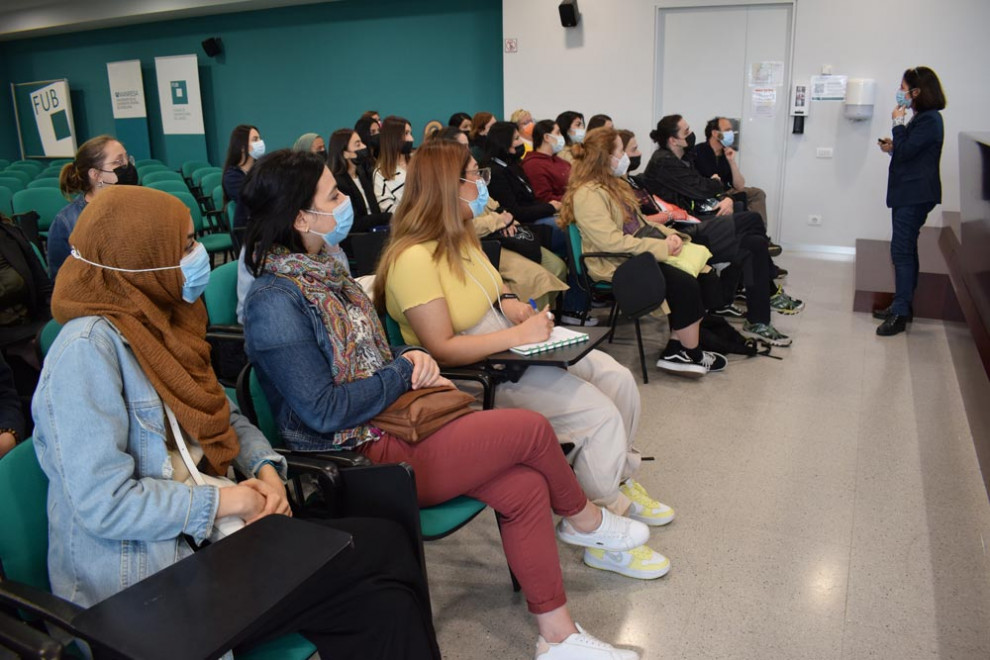
by Àngels Fusté | abr. 28, 2022 | General
A group of 29 people, comprising 26 students of the bachelor’s degree in Early Childhood Education and 3 teachers from the Erasmushogeschool Brussel are visiting UManresa to learn about the experience of the Faculty of Social Sciences of the Manresa campus of the UVic-UCC in the field of scientific education in early educational stages. The group of students and teachers are interested in learning about the different initiatives promoted by UManresa regarding both the creation of facilities dedicated to science as well as STEM activities in general. In addition to visiting UManresa’s Lab 0_6 and the new Upetita nursery school in the new FUB4 – UManresa Education building, future teachers will take advantage of their stay in Catalonia to find out about other experiences in this field, such as kindergartens, unique schools and the Science Nest of the Natural Sciences Museum of Barcelona, among others.
Apart from the interest the students have in discovering UManresa’s experience in scientific education at an early age, the visit also forms part of the institutional relationship between the Manresa campus and the Belgian university. The objective of the two institutions is for this type of visit to be carried out every year, so that a group of Belgian students can visit Manresa and that UManresa students can also travel to Brussels.
Upon arrival at UManresa, accompanied by the teacher of the Degree in Early Childhood Education, Gabriel Lemkow Tobias, the group was received in the Assembly Hall of the main building by Sílvia Mas Sañé, Dean of the Faculty of Social Sciences of Manresa and vice-rector of the Manresa campus of the UVic-UCC. The group has also participated in a meeting with students of the degree in Early Childhood Education of UManresa.

